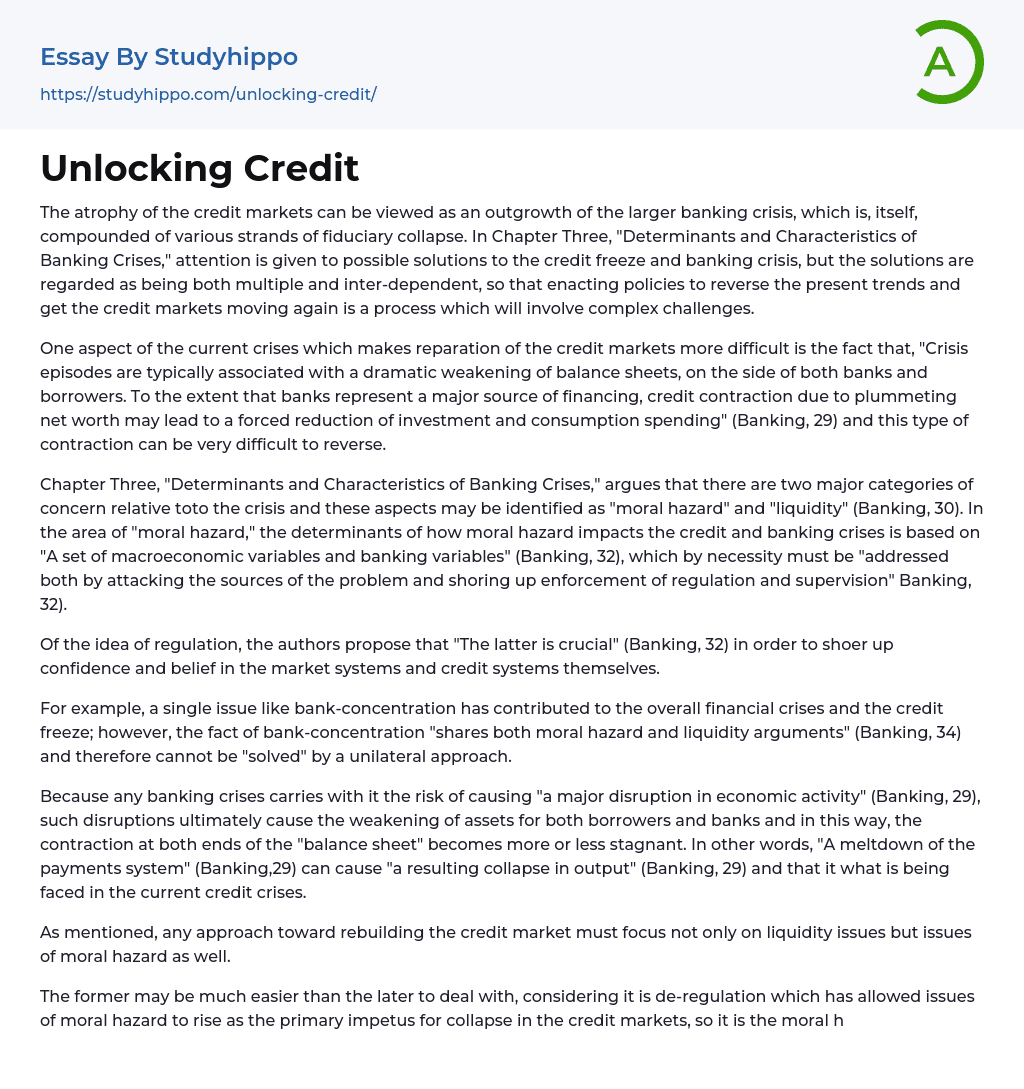The decline of the credit markets is a result of the broader banking crisis, which is compounded by various forms of fiduciary collapse. The third chapter of "Determinants and Characteristics of Banking Crises" examines potential remedies for the banking crisis and credit freeze, however, these solutions are seen as multiple and interconnected. As a result, resolving the present issues and revitalizing the credit markets will require addressing complex challenges. A significant obstacle to repairing the credit markets is that "Crisis episodes are typically associated with a dramatic weakening of balance sheets, on the side of both banks and borrowers," (Banking, 29) which leads to credit contraction due to declining net worth. This type of contraction can be extremely difficult to reverse and may lead to reduced consumption and investment spending. Chapter Three identifies two significant areas of con
...cern regarding the crisis categorized as "moral hazard" and "liquidity" (Banking, 30).The effects of moral hazard on credit and banking crises rely on both macroeconomic and banking variables, according to Banking (32). Addressing the root causes of the issue and strengthening regulatory and supervisory enforcement are essential. The authors stress that regulation is crucial to instill confidence in market and credit systems (Banking, 32). Bank-concentration is a contributing factor to financial crises, but since it involves both moral hazard and liquidity arguments, a unilateral solution is not feasible (Banking, 34). When a banking crisis occurs, it poses a significant risk of disrupting economic activity (Banking, 29). This ultimately weakens assets for both borrowers and banks and results in a stagnant balance sheet. The current credit crisis is a prime example of this as a payment system meltdown ca
lead to an output collapse (Banking, 29).The focus of rebuilding the credit market must not only concentrate on liquidity issues, but also on moral hazard issues, which have been allowed to rise as a result of de-regulation and have contributed to the collapse of credit markets. The moral hazard aspect of the crisis has generated and sustained the liquidity crisis. Chapter Three raises many questions, some of which seem rudimentary and self-evident. For example, should regulatory bodies not be responsible for maintaining the moral "rectitude" and functionality of the financial systems? Currently, accountability may be desired but not applicable in cases where the Treasury Secretary and President are involved. The consideration of "retroactive" taxes or the repeal of top-income tax breaks implemented by the Bush administration is another issue. The reality of higher corporate taxes may impact moral hazard issues in relation to the current crisis. Lastly, despite banks receiving an infusion of cash, there has been no corresponding loosening of the liquidity crisis.Doesn't the failure of cash infusions to revive the credit markets provide evidence for the proposal in Chapter Three of addressing not just liquidity but also moral problems?
- Commercial Bank essays
- Debit Card essays
- Deposit Account essays
- Subprime Lending essays
- Bank essays
- Banking essays
- Corporate Finance essays
- Credit Card essays
- Currency essays
- Debt essays
- Donation essays
- Enron Scandal essays
- Equity essays
- Financial Accounting essays
- Financial Crisis essays
- Financial News essays
- Financial Ratios essays
- Financial Services essays
- Forecasting essays
- Foreign Exchange Market essays
- Free Market essays
- Gold essays
- Investment essays
- Legacy essays
- Loan essays
- Market Segmentation essays
- Money essays
- Personal finance essays
- Purchasing essays
- Retirement essays
- Shareholder essays
- Stock Market essays
- Supply And Demand essays
- Venture Capital essays
- American Dream essays
- Barriers To Entry essays
- Capitalism essays
- Central Bank essays
- Compensation essays
- Consumerism essays
- Economic Development essays
- Economic Growth essays
- Economic Inequality essays
- Economic System essays
- Economy essays
- Employment essays
- Export essays
- Finance essays
- Free Trade essays
- Gross Domestic Product essays




